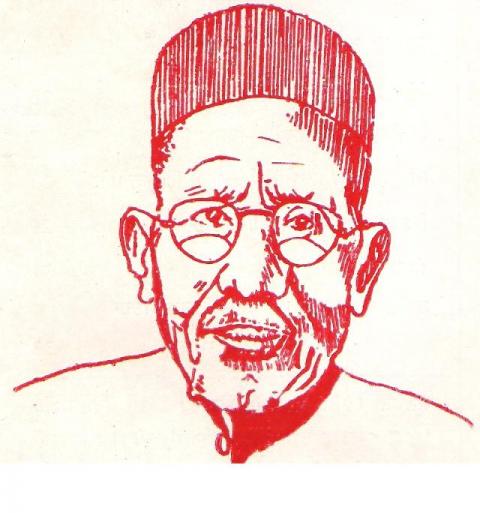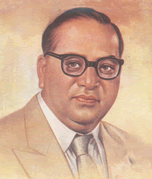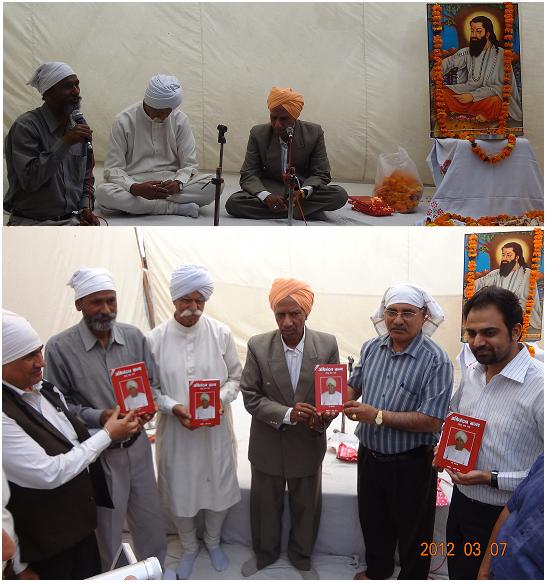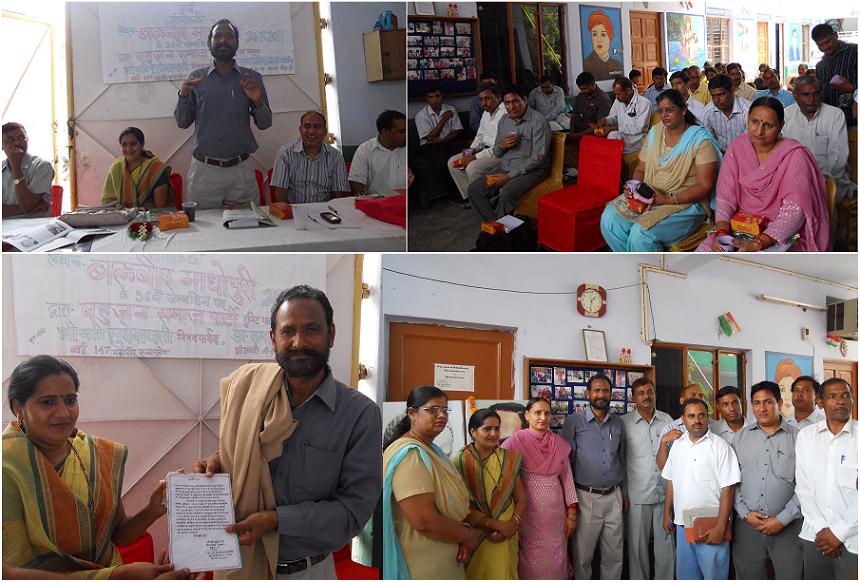"TREE-LOPPED"
Shri
Balbir Madhopuri Editor: Yojna (Panjabi)
Malwinderjit
Singh Waraich
The words 'tree-lopped' denote the
annual spring-time lopping of shady trees, having benefited by their shade
and shelter when needed, lest they spread too wide, signifying here the
typical attitude of the upper castes towards the outcastes. The writing,
however, transcends the theme and depicts the panorama of human existence
with all its richness.
What catalyzed this narrative was an article by Balbir, "Grandmother - a chronicle", published in 1997 which got a keen response. Then, stung by all-pervading indifference to the fate of the lesser born, the writer felt that this account may or perhaps could cause a ripple in this ocean of complacence like a pebble thrown in water.
It begins with the depiction of the ecological setting of his village Madhopur in the alluvial soil on the left bank of the river Beas, its caste scenario – the subjugation and the exploitation, sanctified both by the scriptures and the statute, assigning all the menial chores to the outcastes and their reward being the remains of the dead cattle, their houses too located in the west of the village lest their shadow falls on the twice-born and also to ensure the flow of the dirty drains towards their locality.
"Madhopur" figures in the name-identity of Balbir as a surrogate surname, though he shed 'Chand' from his name in 1972 finding it a sort of Hindu scriptural legacy which sanctified perpetual subjugation of the outcastes. This said, it goes to his credit and it is no small matter that here as elsewhere he maintains his matter-of-fact tenor while depicting the complex denouement of the scenario, rarely, if ever permitting a tinge of bitterness in his narrative.
As a child he recalls, being shood off by the village Gurudwara priest while he was just hanging around the precincts, looking forward to the distribution of sweet-pudding/'prasad'; often he began his day by going around the neighbouring houses to borrow a burning piece of wood fuel for igniting the kitchen fire, a match box being unaffordable!
Insults are publicly hurled on 'them' collectively as a community, blaming them all by an ill-clad Jat early one morning berated them, accusing their womenfolk of pilfering his standing green fodder crop, resulting in a veritable confrontation, saved from a skirmish just by providence, so as to say. The boy, later daydreams of a job at a place like Delhi like his cousin, as the way out; this dream was destined to be realized not very late in his life but, as the events unfolded, the specter of caste did not vanish in the thin air!
'Bloom amidst cactus' portrays that phase of the growing boy's life when the father feels tempted to yoke him in regular work in the farmers' fields while the indulgent mother not unexpectedly takes up the cudgels on her son's behalf, prompting the father to say; "Ok my boy, enjoy as long as you may….", the words which kept on haunting the boy while recalling, over and over again the host of daily chores which he had to perform often at the cost of both his studies and self-esteem.
Then on one coldish wintry morning (Jan. 1966) school headmaster calls an emergency assembly to pronounce the demise of the incumbent Prime-Minister Lal Bahadur Shastri, eulogizing by way of tribute, his will power which made him rise in life even being poor and an orphan. The boy found solace in this account and felt inspired to emulate Shastri ji.
While outgrowing his adolescence, he sometimes, finds himself admiring his father for his grit even after he had been berated by the latter which was usual when annoyed. In particular, he could not help admiring father when the boy overheard him counseling resistance in unison to the fellow caste men from U.P. who, while sharing their woes had also disclosed that even their womenfolk were a game for the privileged.
The 'tree lopped' figures in the context of a cold wintry day in 1968-69, when in the distantly located middle school, when he was about to complete his final i.e. eighth class, the Head Master, in the morning assembly directs everyone to sit down except those who wear the same dress at home and in the school. This done, the boy felt humiliated to his marrow bones since he had some consolation till date that at least in this school his peers were not cognizant of his caste status proverbially associated with privations. Overnight his imagination took wings by virtue of which, as if by a metamorphosis, his father, uncles and cousins appeared in visage of the tree …lopped…
Once his grandmother, as in the flash-back, recounted their family's emigration to Madhopur from their ancestral village some 3-4 generations back to inherit the maternal estate of an issueless kin of their ancestor's mother. The estate thus inherited comprised 100 sq. yds. of area, which provided them the space for themselves and their cattle too. House, if it were to be so designated, comprised of perpetually crumbling mud walls with shaky leaking roofs, yielding to downpours just after offering token resistance!
The winter eternally associated with food scarcity for the deprived, impelled the family to send the boy with an empty bucket to collect the dirt-waste from the jaggery (gur) making farmers' fields for their survival, earning the epithet 'dirt-eaters' from his Jat agemates.
The mother undaunted by all the privations entailed in such a predicament and run down by repeated confinements, could yet be heard humming her pet folk song while churning the buttermilk early morning, nostalgically harking back to the fond memories of the indulgent father!
A random visit of a blind sadhu to the village, who addressed a congregation of sorts expounding the myth of caste origin from the different parts of the body of 'Brahma' the proverbial god of creation, when quizzed, could not hold his ground, catalyzing a searching look into the entire phenomenon of the caste rationale by many among the audience. In particular, the boy, while lying in his bed during the night, kept on weaving a rosy picture of a caste free dawn, the words of comrade guests interlocutors ringing a melodious tune in his mind-ears!
'Caste reigns supreme when die was cast' came like a rude shock to the idealist in the youngster, who, mesmerized by the pretensions of the local comrades, who happen to be Jats by caste, had taken them at their word pledging justice and universal equality, found them too siding with their caste brethren when the lines were drawn in the village over the issue of enhancement of the wage of the daily wagers… echoing 'yee too brute'! It is different matter though, that at a later stage in his life he chose to join the communist party, and that too as an activist, again to leave it in the long run.
But then 'caste too yielded to class' when the chips were down….dawned upon the besieged family, when the real Mamu of the boy, an I.A.S. officer washed off his hands of the whole affair when approached by the family to approve regularization of the ad hoc job of his father a labour hand in the Co-operative Sugar Mills, Bhogpur while he was himself at the helm of affairs as Secretary Co-operatives, tamely hiding behind the 'status constraints'!
Amidst this grim scenario, there stood a character who defied age, tradition and orthodoxy, the dauntless de facto matriarch of the village, who could take anyone to task including the high caste womenfolk for bypassing her without taking cognizance of her presence while she seated under the banyan tree, her normal seat, the trusted confidant cum caretaker of quite a few among the Jat families, consultant on call for odd occasions and contingencies, and so on, was none else than the Grand… grand mother.
The granny retained her zest for life till the end; when asked about her favourite dish, she opted for meat-curry, which she took with relish, a few days before her demise. She got accolades from one and all on her passing away when almost the entire village folk joined in her funeral, many old women saying; "She braved half a century of widowhood, braving all the hurdles that came her way, dauntlessly!" To the boy, the balloons hovering over her bier symbolized her self-esteem!
The intertwined duo of papal-banyan trees, overlooking our houses, referred to as cobbler's/'chamars' banyan (tree) was a focal point for the village too by virtue of its 'strategic' location. During the days of harvest, the prospective hirers of labour, the Jats would converge here to rope in the desired hands leading to a usual haggling over wages, it was also the favoured site for 'cultural' events, the acrobatic shows, while it sheltered the loom pits of their families. As per the version of boy's father, it could have been planted during the late seventies of the 19 th century. One odd evening of Feb. 1972 the boy returns from the school to find it butchered, literally. It was a different matter though, that the boy's father found some solace in the avoidance of the nuisance associated with it, when the spoiled Jat brats used to gather there to create unruly scenes.
'Among the thorny desert, there was an oasis' depicts the families' filial bonds with a Jat family in the neighbouring village, Sholapur which stood the test of time.
With the flux of time Balbir became an employee of F.C.I. after his graduation, overcoming the seemingly unsurmountable hurdles. The radical in him drew him towards Communist Party soon to be swept to the literary stream, impelled by the poet-aesthete in him. Career-wise, he succeeded in getting a gazetted officer's post in the high-profile Ministry of Information and Broadcasting, earning him a permanent posting in Delhi . His caste tag was still to haunt him since no high caste landlord would brook a lowcaste tenant, and as it were the house-owners were from the twice-born only, almost all of them.
This set him on the path of mundane struggle to somehow husband adequate resources to have a house which he could call his own!
Viewed as a whole, this self-account venture into the 'danger zone' of the caste based disabilities, which are otherwise bypassed, as if by a conspiracy of silence. A routine conversation between a Jat and a Chamar which we come across in this writing here and there, reproduced verbatim would lay bare the ugly face of the innocuously uttered word 'caste' much more explicitly than all the high profile scholarly treatise on this curse would do cumulatively. The stigma of being born as an untouchable chases the victim literally from cradle to cremation taking protean forms, in between.
It goes to the credit of Balbir, however, that he goes all out to depict the entire spectrum of the scenario like the fads and foibles of particular individuals and of communities, the phenomenon of ghosts as it is perceived by him as a child, descending of locust swarms on the village, impact of droughts and downpours, the timing of planting of banyan tree, a famine in the neighbouring state of Rajasthan, the style of their family barber, the debate on world peace catalyzed by some comrades, robes of the folk artists, feats of the acrobats, joking styles of 'Mirasis', the traits of a particular buffalo, the panorama beneath the shade of the banyan tree, each with an eye for the nondescript details with the precision of the seasoned spy, and is able to paint a word picture thereof to make it come alive.
Equally life-like is his portrayal of the persona, the characters, those which loom large on the horizon like his father, mother and granny, besides host of others who figure at random, none among these appears to be 'flat' or 'two-dimensional', each retaining his idiosyncrasies despite his typicality.
There are quite a number of dramatic scenarios like the polemic exchanges about the origin of caste, the rationale behind Brahmanic rituals, the sacredness of the cow, which occur in their pristine spontaneity, yet able to expose the chinks in armour of the orthodox myths and blind beliefs laying bare the contradictions inherent therein.
All in all, it reveals the seamy side of our social fabric, from a standpoint of a sufferer, and that is a rarity itself, being straight from horse's mouth and that too while maintaining his sense of proportion and faith in human values.
Posted on March 31, 2009 |








